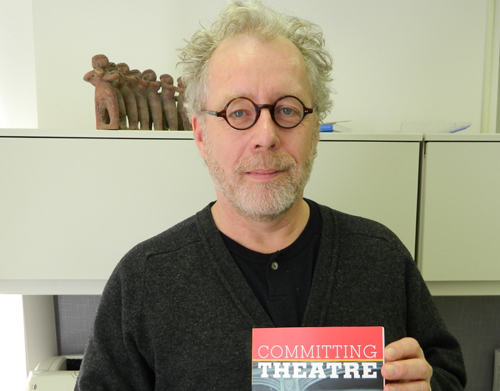
Prof. Alan Filewod says he can change your perspective on reality with an object he holds concealed in his hand. The object? A red clown’s nose. When he puts it on, you can’t help but smile, maybe even laugh out loud. Your perspective has changed.
Is that theatre? Maybe. As a theatre historian, Filewod is fascinated not just by the ebb and flow of professional and popular theatre, but by the use of “performance and theatricality” to convey ideas, protest against injustice and make political statements.
He describes an incident that happened in Vancouver in 1919: a resident had become increasingly frustrated by the problem of tent caterpillars on the property beside his home and the municipal government’s reluctance to do anything about it. He drew attention to the situation by travelling to Vancouver City Hall and presenting the mayor’s secretary (giving a little bow and flourish) with a bouquet of flowers covered in tent caterpillars.
That’s theatre, Filewod says, and follows up with another example. He points to a photograph from 1908 showing the City of Guelph’s Old Boys parade with a man dressed as a woman in the middle of the photo. “I don’t know the context of that, but there is certainly a point being made,” he says. And that’s theatre, too.
The photo of the Old Boys parade and anecdote about the tent caterpillar bouquet in Vancouver are both included in his latest book, published in 2011, titled Committing Theatre: Theatre Radicalism and Political Intervention in Canada. Much of the research was culled from U of G’s archives, he says, adding, “We have an incredible archive of theatre history here. There’s so much material.”
U of G itself has a long history of using theatre to make political and protest statements. “In the early 1900s, the OAC students were conducting mock parliaments in Massey Hall and negotiating the issues of suffrage, and the women at Macdonald Institute were doing their own shows, parodying the idea that women only came to the school to find a husband,” Filewod says.
His knowledge of the uses of theatre comes not only from rummaging through the archives, but from his personal experiences. For most of his adult life, Filewod has been “participating in theatre,” as he puts it. “When I was in my 20s, I travelled around Newfoundland doing plays with miners and fishermen and living in an old school bus,” he recalls. Today he works with students on plays and explores other theatrical forms.
Lately, Filewod has become interested in another activity rarely recognized as theatre: historical re-enactments of battles or other events. While they may not take place on a traditional stage, these events do require extensive costuming and rehearsals and often attract large audiences who watch the choreographed battles play out in open fields. “I call the re-enactors heritage guerrillas,” he says. “I think there’s no real difference between being a War of 1812 re-enactor or a devoted Star Trek fan who dresses in costume at conferences.”
And like the other theatrical performances Filewod describes, these also convey a message. Re-enactments, he says, are about fixing a particular reading on the past. “The values we see inscribed in these events are the heroic values of frontline, masculinist combat,” he says. “It’s a very conservative type of guerrilla theatre.”
There’s also a fetish for authenticity and getting every detail right in both the re-enactors and the Star Trek fans, he adds.